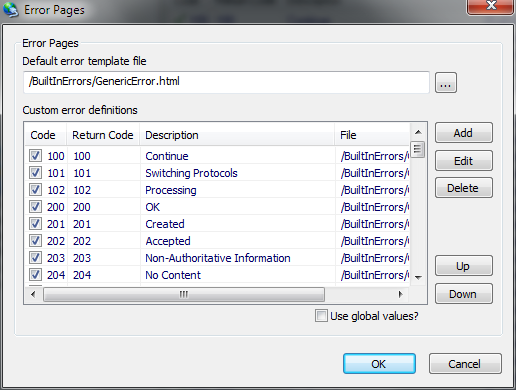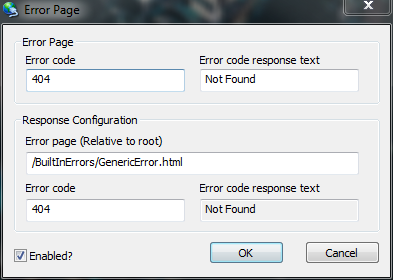|
|
Website - Settings - Error Pages
The error pages configuration is used to map standard HTTP error numbers to human readable
text and to override HTTP errors with alternate success codes or even alternate pages/scripts.
The error pages configuration could be used (for example) to redirect all 404 errors to a search page.
When an error message is sent, the server will always respond with an error page. This page could be the
built-in default error page or could be a custom page - when this page is a script (handled by a
scripting engine) information about the original request
is made available via environment variables which can be access from within the script. When this alternate
page is a static file (such as HTML), information on the original error is made available via
Server Side Includes. In addition, the script may also
be post-parsed for SSI tags - thereby also making information
about the original request available via Server Side Includes.
Environment variables and SSI tags:
| ORIGINAL_PATH_INFO |
The original extra path information. |
| ORIGINAL_SCRIPT_FILENAME |
The original name of the local script of file which was requested by the peer. |
| ORIGINAL_REQUEST |
the original full untranslated request made by the peer. |
| ORIGINAL_PATH_TRANSLATED |
The original locally translated request made by the peer. |
| ORIGINAL_SCRIPT_NAME |
The original relative name of the file requested by the peer. |
| ORIGINAL_MIME_TYPE |
The original mime type of the file requested by the peer. |
Error Pages
Allows the server administrator to add, edit, delete and reorder website error pages.

Error Pages - Item

| Error code |
Defines the error code which will trigger this defined error response. |
| Error code response text |
Defines the error text which will be sent to the connected peer in the HTTP header. This should be kept short (under 100 characters). |
| Error page |
The realitive-to-root path to an error page. This can be mapped as local through the use of virtual roots. |
| Error code (Response) |
The alternate error code which should be sent instead of the error which actually occured. A common use is to set this to 200 (OK) so that the peer does not receive a built-in browser error when the server delivers a custom page. This code must be defined in the custom error configuration as it is used to determine the alternate error code response text. |
| Error code response text (Response) |
The alternate error text sent to the connected peer. This is automaticly determined via the custom error code. |
|
|
|





